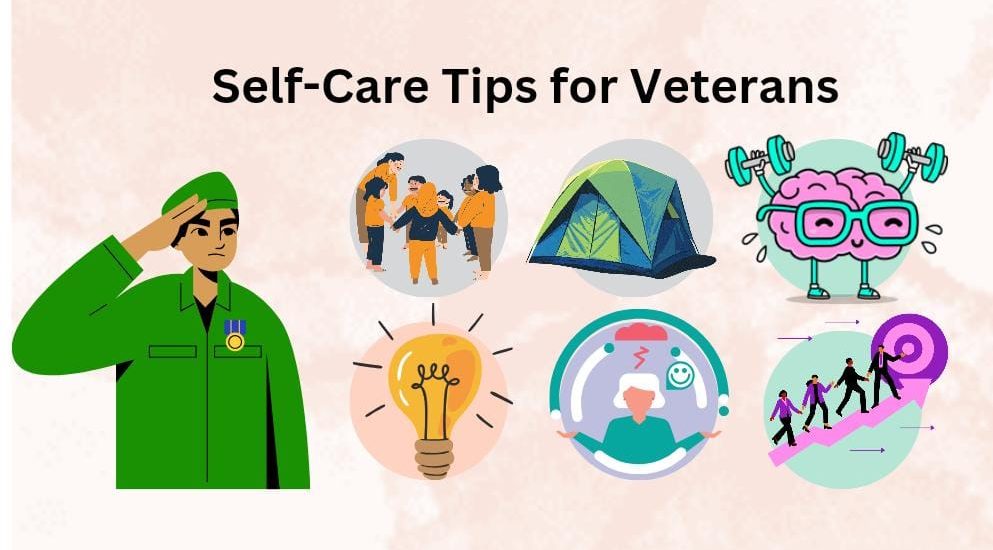Transitioning from military to civilian life can be a challenging journey for many veterans. It’s a path that requires more than just physical adjustment; mental and emotional wellness plays a crucial role too. To begin with, embracing a balanced lifestyle is crucial.
This involves not only looking after your physical health through regular exercise and a nutritious diet but also ensuring mental well-being.
Physical activity, for instance, is more than just a health recommendation; it’s a therapeutic tool. Exercises like yoga, jogging, or even simple daily walks can significantly reduce symptoms of PTSD, anxiety, and depression. It’s about finding an activity that resonates with you and makes you feel good.
Equally important is diet. Nutritional care is not about stringent diet plans but understanding what your body needs.
Foods rich in omega-3 fatty acids, for example, are known to enhance mood and cognitive function. Meanwhile, regular hydration and a balanced intake of fruits, vegetables, and proteins can keep your body well-fueled and your mind sharp.
Fostering Social Connections
Humans are inherently social beings, and veterans are no exception. Building and maintaining strong social connections is an essential aspect of self-care. Whether it’s rekindling old friendships, joining a veterans’ group, or engaging in community activities, these connections can provide invaluable support.
One of the best ways to foster these connections is through shared experiences. Participating in group activities, whether they’re recreational, educational, or volunteer work, creates a sense of belonging and purpose.
It’s also important to remember that maintaining relationships requires effort from both sides. Communication, understanding, and patience are key.
Regular Health Checkups and the Camp Lejeune Toxic Water Concern
One of the lesser-known yet crucial aspects of veteran health is the awareness and management of long-term health issues, especially for those who might have been exposed to Camp Lejeune toxic water.
Between the 1950s and 1980s, the water at Marine Corps Base Camp Lejeune was contaminated with harmful chemicals, leading to various health problems among those who lived or worked there.
If you were at Camp Lejeune during this period, regular health checkups are vital. These checkups should be more comprehensive than the average annual physical.
Discuss your specific exposure with your healthcare provider and ensure that screenings for conditions related to the contamination, such as certain cancers or kidney issues, are part of your routine health assessments.
This proactive approach to health is about taking control and staying informed. Understanding the potential long-term impacts and keeping an open dialogue with your healthcare provider can help in the early detection and effective management of any health issues that may arise.
Prioritizing Mental Health
Mental health is a critical aspect of self-care, yet it’s often overlooked. Many veterans face challenges like PTSD, depression, and anxiety. Acknowledging these issues and seeking professional help is not a sign of weakness but of strength and self-awareness.
Therapy and counseling can provide a safe space to discuss and understand your experiences and feelings. There are various therapeutic approaches, such as cognitive-behavioral therapy or EMDR (Eye Movement Desensitization and Reprocessing), that have been effective for many veterans.
Additionally, mindfulness practices like meditation can offer a way to find inner peace and manage stress.
It’s also important to be aware of the signs of mental health struggles, not only in oneself but in fellow veterans. Being proactive in seeking help or encouraging others to do so can make a significant difference in the journey to mental wellness.
Investing in Personal Development and Learning
Finally, investing in personal development and continuous learning can be a powerful form of self-care. Learning new skills, pursuing education, or even indulging in a hobby can provide a sense of accomplishment and purpose.
This could be as simple as taking a cooking class, learning a musical instrument, or enrolling in a course that interests you. These activities are not just about skill acquisition; they’re about creating a positive mental space where you can grow and thrive.
Nurturing Resilience Through Creative Expression
Another vital aspect of self-care for veterans is nurturing resilience through creative expression. This avenue allows for the exploration of thoughts and feelings that might be difficult to articulate in words.
Engaging in creative activities such as painting, writing, photography, or even gardening can be incredibly therapeutic. It offers a unique way to process experiences and emotions.
For many veterans, the act of creating something can be a powerful form of self-expression and healing. For example, writing—whether it’s journaling, poetry, or storytelling—can help in organizing thoughts and making sense of past experiences. It can be a private reflection or something shared with others, providing a sense of release and understanding.
Art, in its various forms, offers a similar outlet. Painting or drawing, for instance, can be a non-verbal way to express emotions that are too complex or overwhelming to put into words. It’s not about the skill or the end product but rather the process of creation and the emotional journey it represents.
Similarly, photography can be a way to capture and process the world from your unique perspective, offering a sense of control and creativity.
Gardening, too, is a form of creative expression that nurtures patience, care, and a connection with nature, all of which can be deeply healing.
These creative activities not only contribute to reducing stress and anxiety but also help in building a sense of identity outside the military. They can be a source of joy, a means of connecting with others, and a way to build new skills and interests.
Engaging in creative expression is a profound step towards nurturing resilience, understanding oneself better, and finding peace in the post-service journey.
Conclusion
Self-care for veterans encompasses a holistic approach, focusing on physical health, social connections, mental well-being, proactive health management, and personal development.
By prioritizing these aspects, veterans can navigate the transition to civilian life with resilience and positivity, leading to a fulfilling and healthy life post-service.

